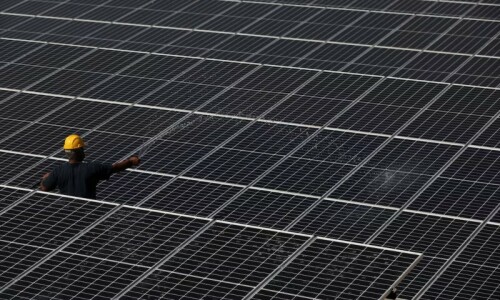THE federal government has decided to help Balochistan replace 30,000 conventional tubewells to ones powered by solar panels.
The provincial government will come up with a feasibility plan in this regard within a month, according to newspaper reports. On its part, the federal government will divert part of a Rs23 billion annual subsidy meant for irrigation in Balochistan to enable provincial authorities bear the cost of the tubewells’ replacement.
The provincial government will also work out project details such as setting a timeline, prioritising areas where tubewells should be replaced, and deciding whether to bear all the project cost or seek farmers’ participation, sources in the provincial agriculture sector say.
However, they fear that the plan can be jeopardised if federal authorities insist on first clearing the overdue bills of electricity consumed by 30,000 conventional tubewells.
The federal government wants swift clearance of all outstanding power bills accrued against various departments of Balochistan as well as of other provinces. The unpaid bills lead to intra-corporate debts of power-sector companies, adding to fiscal woes of the federal government.
However, the mere announcement of equipping Balochistan’s tubewells with solar panels is encouraging. “If the plan works well, the cost of running tubewells would fall dramatically (in the absence of monthly billing for electricity consumption) and enable us to utilise the federal subsidy in other important projects of agriculture modernisation,” hopes a senior official of the provincial agriculture department.
Banks have rolled out schemes for clean energy financing, including loans for solar-powered tubewells, but individual farmers complain they have difficulty in obtaining loans
The use of solar-powered tubewells has great potential for minimising the cost of irrigation and for making agriculture efficient and environment-friendly.
Since the 2010-11 fiscal year, when agriculture (along with other departments) became a completely provincial subject after the 18th Constitutional Amendment, provincial governments have been trying to help farmers switch over to solar-powered tubewells.
But progress in this regard has been slower than anticipated. One major reason is perhaps the use of subsidies instead of programmes to raise awareness and to help create a domestic market.
Even where it is imperative to go for something new initially with subsidies, projects are marred because of corruption or bureaucratic red tape.
Encouraging banks to lend money to farmers for installing solar-powered tubewells a few years back was a right step in the right direction. But then banks prefer operating in an organised market and seldom agree on becoming part of an evolving market. Therefore, prioritised lending areas remain neglected even after repeated reminders by the State Bank of Pakistan (SBP).
The SBP’s revised scheme for renewable energy introduced in June last year is a case in point. Under that scheme, the scope of bank lending for renewable energy projects was extended to smaller projects for generating up to one megawatt of electricity.
That came as a ray for hope for the installation of solar-powered tubewells on a mass scale. But it still remains a dream.
In September last year USAID, the American agency for development aid, also signed an agreement with five Pakistani banks — namely HBL, MCB Bank, Faysal Bank, Meezan Bank and JS Bank — to help them lend for clean energy projects under an $88m project.
These banks rolled out schemes for clean energy financing, including loans for solar-powered tubewells. But individual farmers still complain about the difficulties in obtaining loans.
Bankers claim that in most cases applicants don’t fulfil the paperwork requirements, which makes it difficult for banks to approve loans. However, small and medium sized companies that import and install solar panels are getting loans from banks.
There are over two dozen such companies active in business. But only a few suppliers of solar panels for tubewells in subsidised schemes in Punjab and elsewhere are thriving, industry sources say.
The Punjab government has been providing farmers with solar-powered tubewells on 80 per cent subsidy since 2013-14. Besides, it has also been working, with the help of foreign funding, to replace conventional tubewells with those that run on solar power.
The Sindh government is also pursuing similar plans. It is already working on 11 separate schemes to install solar-powered tubewells and pumping stations at a cost of Rs7.8bn. Of this, Rs2.6bn has already been utilised, Chief Minister Murad Ali Shah was told by officials at a recent meeting held to take stock of the problems facing the province’s irrigation system.
However, despite efforts by provincial governments and big individual landlords, the pace of progress to promote solar-powered tubewells remains slow. Moreover, there’s no data showing the number of such tubewells currently in operation.
Provincial authorities collect and report the number of tubewells and the Ministry of National Food Security and Research presents consolidated data on the basis of those numbers.
However, until 2014-15 (the last year for which data is available), solar-powered tubewells were not shown separately. One reason for not collecting separate data may be that they constitute a tiny percentage of the total.
At the end of 2014-15, an estimated 1.3m tube-wells were in operation, up from 1m in 2011-12. Media reports suggest that only a few thousand among them were solar-powered.
The latest move to replace 30,000 conventional tube-wells in Balochistan to solar-
powered ones can boost the number of such tube-wells in the short run. But authorities must also start maintaining exclusive data on
solar-powered tubewells for effective policymaking and market development.
Published in Dawn, The Business and Finance Weekly, November 12th, 2017













































Dear visitor, the comments section is undergoing an overhaul and will return soon.